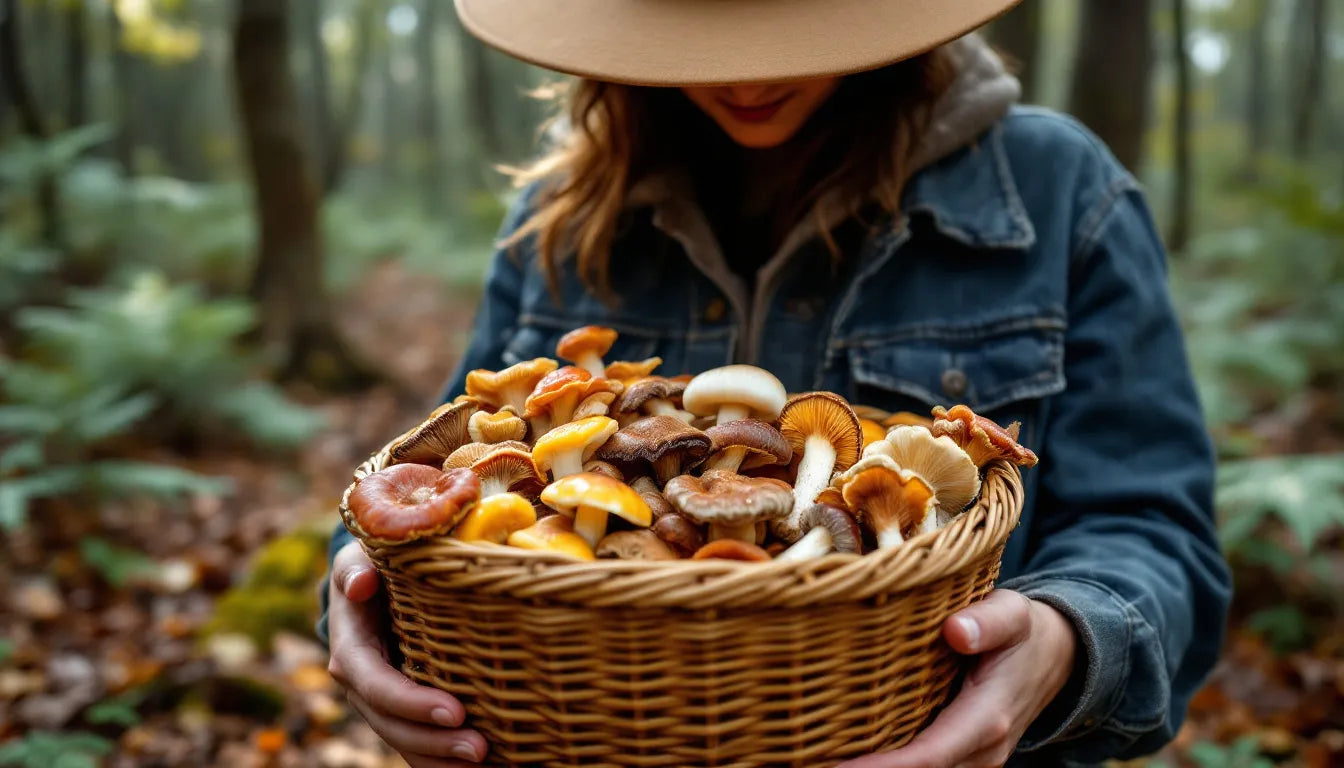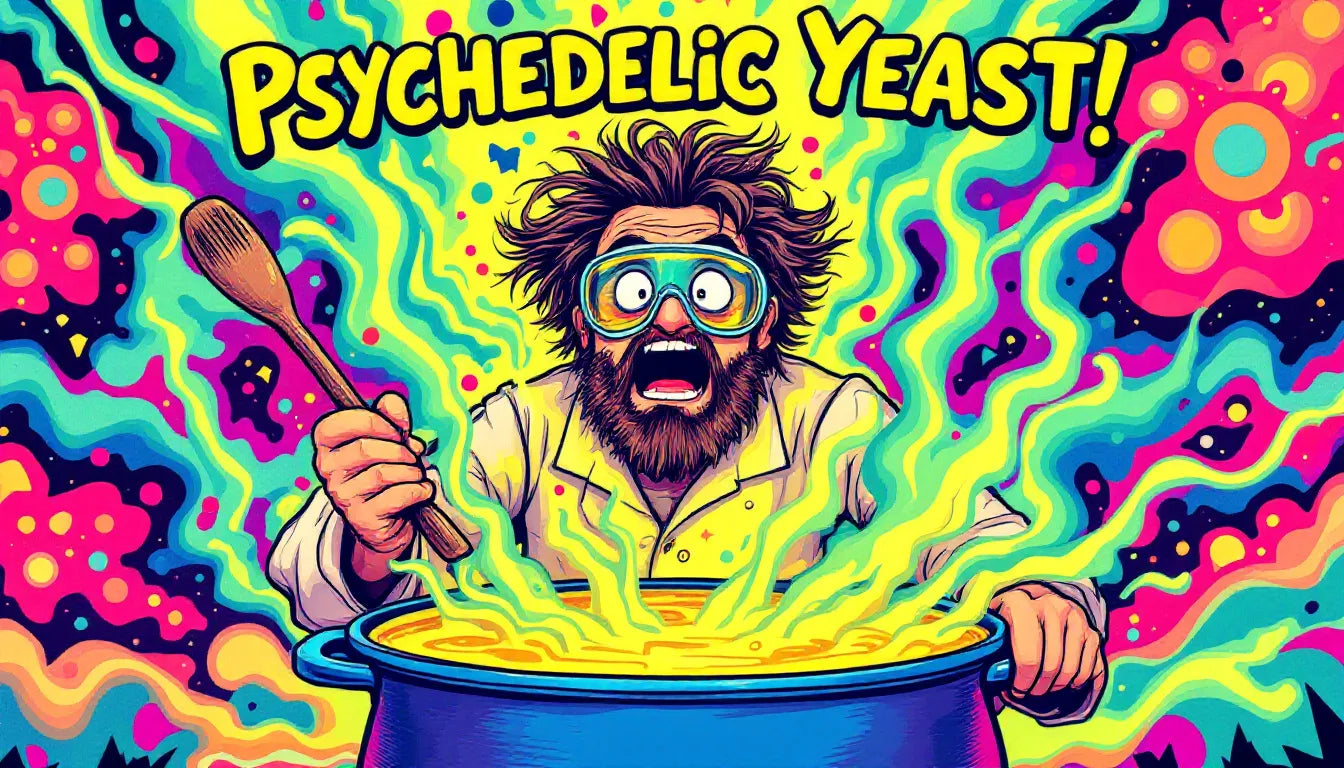- 🧪 Scientists have successfully engineered yeast to produce psilocybin, eliminating the need for traditional magic mushroom cultivation.
- 💊 Research suggests psilocybin therapy can significantly improve treatment-resistant depression, PTSD, and anxiety.
- ⚖️ The FDA has granted "breakthrough therapy" status to psilocybin treatment, accelerating research into its medical applications.
- 🔬 Yeast fermentation ensures cost-effective, scalable, and contamination-free psilocybin production, unlike traditional mushroom cultivation.
- 🏛️ Regulatory and ethical challenges remain, particularly concerning legalization, corporate control, and accessibility of synthetic psilocybin.

Introduction: The Breakthrough in Psilocybin Production
Scientists have successfully engineered yeast to produce psilocybin, the psychoactive compound in magic mushrooms. This innovative biotechnology could revolutionize psychedelic-assisted therapy by making psilocybin more accessible, cost-effective, and scalable. With increasing research on its potential in treating mental health disorders, yeast fermentation offers a promising alternative to traditional cultivation, addressing issues of consistency, contamination, and legal restrictions—concerns often faced when working with traditional methods such as mushroom grow bags.

What is Psilocybin?
Psilocybin is a naturally occurring psychedelic compound that alters human perception, cognition, and mood. It is primarily found in Psilocybe species of mushrooms, often referred to as magic mushrooms. Upon ingestion, the body metabolizes psilocybin into psilocin, which then interacts with serotonin receptors in the brain, leading to altered states of consciousness.
Psilocybin has been used for centuries in indigenous rituals and spiritual practices. However, in recent decades, scientific research has demonstrated its potential for treating mental health disorders such as depression, anxiety, PTSD, and substance use disorders. Due to its promising therapeutic effects, there is a growing demand for high-quality, standardized psilocybin—an issue that yeast fermentation may help solve.

Yeast Fermentation: A New Method for Producing Psilocybin
Traditional psilocybin production relies on growing magic mushrooms, which is time-intensive and requires precise environmental conditions. Scientists have introduced an alternative method by engineering yeast strains to biosynthesize psilocybin.
How Does Yeast Fermentation Work?
By inserting genes from magic mushrooms into the yeast genome, researchers have enabled yeast to biosynthesize psilocybin through metabolic pathways. The process involves the following steps:
- Genetic Modification – Scientists identify and insert key genes responsible for psilocybin production from Psilocybe cubensis (or other species) into Saccharomyces cerevisiae (brewer's yeast).
- Fermentation Process – The genetically modified yeast is cultured in a controlled environment where it feeds on sugars and nutrients.
- Psilocybin Synthesis – As the yeast metabolizes sugars, it undergoes enzymatic reactions that lead to the production of psilocybin as a byproduct.
- Extraction and Purification – The synthesized psilocybin is then isolated and purified for pharmaceutical or research use.
This bioengineered approach eliminates the need for fungal cultivation and provides a more reliable and efficient production method.

Why is Yeast Fermentation a Game-Changer?
The adoption of yeast fermentation for psilocybin production represents a significant breakthrough in the biotechnology and pharmaceutical industries. Here are some of the key advantages of this method:
1. Cost Efficiency
Growing magic mushrooms requires a large amount of time and resources, including specific humidity, temperature, and substrate conditions. In contrast, yeast fermentation allows for a streamlined production process that can take place in bioreactors, reducing overhead costs. Since yeast rapidly proliferates, it can produce psilocybin in shorter time frames, making large-scale production both feasible and cost-effective.
2. Purity and Consistency
One of the challenges with using naturally grown mushrooms is the variability in psilocybin content. Different strains and growing conditions can result in inconsistent potency, making dosing difficult for therapeutic applications. Yeast fermentation eliminates this issue by ensuring a controlled environment where psilocybin output is uniform and free from contaminants, ensuring pharmaceutical-grade purity.
3. Scalability
With increasing interest in psilocybin-assisted therapy, demand for psilocybin is expected to rise. Large-scale mushroom cultivation presents logistical and regulatory challenges, but yeast-based production can be conducted in controlled lab environments using bioreactors. This industrial-scale production method allows for the rapid expansion of psilocybin supply, supporting clinical research and eventual commercialization.

Psilocybin and Its Mental Health Benefits
Research into psilocybin as a treatment for mental health disorders has gained traction, particularly for its impact on depression, PTSD, and anxiety.
1. Depression and Psilocybin Therapy
Multiple clinical trials have demonstrated that psilocybin can provide lasting relief for individuals with treatment-resistant depression. Unlike traditional antidepressants, which need to be taken daily and can have significant side effects, psilocybin therapy typically results in enduring benefits after just one or two sessions. It works by promoting neuroplasticity—allowing the brain to rewire and break free from negative thought patterns.
2. Psilocybin's Role in PTSD Treatment
Psilocybin has shown promise in assisting individuals suffering from PTSD by helping them process traumatic memories in a therapeutic setting. The compound’s effect on serotonin receptors may help alleviate fearful responses and foster emotional resilience. Clinical studies suggest that psilocybin-assisted therapy can significantly reduce PTSD symptoms and improve emotional regulation.
3. Anxiety and Psychedelic-Assisted Therapy
Psilocybin has been explored as a treatment for existential anxiety, particularly among terminally ill patients. Studies have found that a single, guided psilocybin session can lead to significant reductions in anxiety and distress, improving a patient's overall well-being and mental outlook.

FDA and Legal Considerations Surrounding Psilocybin
Psilocybin remains illegal in many countries, though regulatory frameworks are beginning to shift.
- The FDA has granted "breakthrough therapy" status to multiple clinical trials involving psilocybin, recognizing its potential for mental health treatment. This designation is intended to expedite drug development and approval.
- In the United States and Canada, organizations are pushing for decriminalization and medical legalization, with some jurisdictions already allowing psilocybin-assisted therapy under specific conditions.
- If yeast-derived psilocybin production becomes widely accepted, it could make the substance more palatable to regulators by ensuring standardized dosing and safer accessibility through legal medical frameworks.

Challenges and Ethical Considerations in Psilocybin Production via Yeast
Despite its potential benefits, yeast-based psilocybin production does present challenges:
1. Regulatory Hurdles
Because psilocybin remains a Schedule I substance under international drug laws, synthetic production still faces strict legal restrictions. This poses significant barriers to widespread adoption and commercialization.
2. Ethical and Commercialization Concerns
With synthetic psilocybin production comes the potential for corporate monopolization. Large pharmaceutical companies could patent these biosynthetic processes, limiting access to those who can afford it. This issue raises ethical concerns regarding the balance between innovation and equitable access to psychedelic medicine.

How This Discovery Could Shape the Future of Medicine
Psilocybin production via yeast fermentation has broad implications for the future of medicine:
- Standardized Medical-Grade Psychedelics – Yeast fermentation allows for pharmaceutical-grade psilocybin with consistent potency, making it easier to regulate and prescribe in clinical settings.
- Expansion of Psychedelic-Assisted Therapy – More accessible psilocybin could bring psychedelic therapy into mainstream healthcare, providing alternatives for treatment-resistant conditions.
- Shaping Future Drug Policy – The introduction of synthetic psilocybin may influence legal frameworks, potentially paving the way for medical legalization.

Implications for Mycology Enthusiasts and Home Growers
Although yeast fermentation represents a significant technological advancement, it may not be accessible to amateur mycologists or DIY home growers due to legal and technical constraints. However, as regulations evolve, synthetic biology could present new opportunities for independent research and responsible psychedelic use.
Conclusion: The Future of Psilocybin and Mental Health Treatment
Yeast fermentation is revolutionizing psilocybin production by making psychedelic therapy more scalable, consistent, and cost-effective. As research progresses and regulatory frameworks adapt, this breakthrough may lead to the widespread integration of psilocybin-based treatments in psychiatric medicine, offering new hope for individuals struggling with mental health disorders.
FAQs
How have researchers engineered yeast to produce psilocybin?
Scientists modified yeast by inserting genes from magic mushrooms, enabling it to biosynthesize psilocybin during fermentation.
Why is yeast fermentation a promising method for psilocybin production?
It ensures cost-effective, scalable, and consistent production compared to traditional mushroom cultivation.
How does psilocybin help with mental health conditions?
Psilocybin interacts with serotonin receptors, promoting neuroplasticity and alleviating symptoms of depression, PTSD, and anxiety.
What are the current challenges and future implications of this breakthrough?
Regulatory hurdles and ethical concerns over commercialization remain challenges, but yeast fermentation could drive the legalization and medical adoption of psilocybin therapy.



